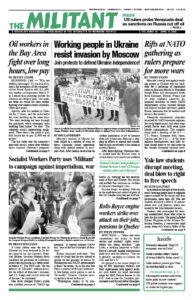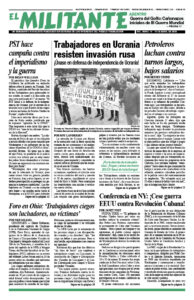April 14, 1997
MIAMI — For the first time in the 38-year history of the Cuban revolution, high-level representatives of the Cuban government spoke before a broad meeting in this city, sponsored by the Miami Coalition to End the U.S. Embargo of Cuba. A crowd of over 200 people, mostly Cuban Americans, attended.
The overwhelming majority enthusiastically applauded Félix Wilson, Second Secretary at the Cuban Interests Section in Washington, D.C.
The day before the event, the Miami police attempted to sabotage it. They told the Miami Airport Inn managers that violence was likely and that they would be more than happy to help them end the meeting.
The event went on and organizers secured the meeting room, as well as outside the hotel.
April 14, 1972
The powerful thrust of North and South Vietnamese regiments against the northern military outposts of the Saigon regime is the largest since the Tet offensive in 1968. It once again testifies to the indomitable strength of the revolution in Vietnam.
Washington is nowhere nearer obtaining its main aim in Vietnam than it was seven years ago when President Johnson began escalating the U.S. intervention. As at that time, the capitalist-landlord regime in Saigon remains in power because of massive U.S. military support.
The Saigon armies fled the revolutionary advance. Four years after the Tet offensive, President Nixon is in a worse situation than Johnson was at that time. The combined forces of the revolutionary armies and the international antiwar movement have forced Washington to withdraw most of its main regiments.
April 12, 1947
In the mightiest upsurge in the communications industry, some 350,000 AT&T telephone workers set up picket lines in a virtually complete tie-up of the nation’s long-distance and switchboard phone service. This is the first nationwide phone strike, involving tens of thousands of newly unionized workers and a total of 230,000 women, the greatest number ever in a single strike.
The phone trust refused to meet or even arbitrate the union demands, which include a $12-a-week raise, a union shop and other long-needed improvements.
In the face of state government threats to seize the phone lines in New Jersey, strikers kept their picket lines intact. This was a significant expression of the workers’ determination to maintain nationwide solidarity and of their understanding that unified action represents a greater power than government edicts.

